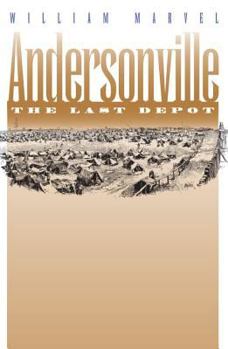Book Overview
Between February 1864 and April 1865, 41,000 Union prisoners of war were taken to the stockade at Anderson Station, Georgia, where nearly 13,000 of them died. Most contemporary accounts placed the blame for the tragedy squarely on the shoulders of the Confederates who administered the prison or on a conspiracy of higher-ranking officials. According to William Marvel, virulent disease and severe shortages of vegetables, medical supplies, and other...
Format:Hardcover
Language:English
ISBN:0807821527
ISBN13:9780807821527
Release Date:January 1994
Publisher:University of North Carolina Press
Length:350 Pages
Weight:1.58 lbs.
Dimensions:1.3" x 6.1" x 9.3"
Customer Reviews
5 ratings
The True story of Andersonville
Published by Thriftbooks.com User , 16 years ago
The last depot depicts the pathetic and political aspects of this prison that I consider more of a battle than Antietam. The suffering was unbelievable. Marvel uses Eugene Forbes as one of as his obscure sources. He uses many more but he makes it clear that Wirz the head of the prison was not the problem but the dissolving Confederacy that was built on shifting sand. Without bias this book shows the horror of being a POW.
SUFFERING AT ANDERSONVILLE
Published by Thriftbooks.com User , 19 years ago
I ONCE SAW A DOCUMENTARY ON THE HISTORY CHANNEL CALLED HORROR ATANDERSONVILLE PRISON THE TRIAL OF HENRY WIRZ.IT ANGERED ME SO MUCH THAT I CONVINCED MY MOTHER TO BY ME A COPY OF THE BOOK FROM YOUR FINE WEBSITE. IT ALLOWED ME TO SEE HOW MUCH THOSE MEN SUFFERED THEY WERE TREATED LIKE CATTLE.BUT AT LEAST YOU FEED CATTLE . THEY WERE TREATED HORRIBLY .AND PEOPLE IN PRISON HAVE THE NERVE TO COMPLAIN THAT THEY ARE BEING TREATED BADLY THEY OUGHT BE LUCKY THAT THEY ARE NOT TREATED LIKE THE SOLIDERS AT ANDERSONVILLE WERE.
A lasting tribute to the nearly 13,000 men who died there.
Published by Thriftbooks.com User , 22 years ago
In Andersonville: The Last Depot, William Marvel gives the serious student of Civil War history a balanced and highly accurate account of what transpired during those fourteen awful months between Feb. 1864 and Apr. 1865. The events of Capt. Henry Wirz's trial and execution are also covered in detail and for the first time we begin to get a glimpse of who the real man was. While the book is filled with many historical facts about the prison itself, Mr. Marvel does not neglect the human side of Andersonville. Through thorough and meticulous research, Mr. Marvel acquaints the reader with men like Thomas "Chickamauga" Herburt, George "Albert", Salvador "Thomas" Genzardi as well as many others. How important is this historical work? In July 2002, I traveled to Andersonville spending two days walking the stockade grounds and those of the national cemetery. This book served as my guide.
Excellent -- dispels a lot of myths
Published by Thriftbooks.com User , 25 years ago
I found this book an excellent read. My sole sources about Andersonville prior to it were Mackinlay Kantor's captivating novel "Andersonville", The 1970 PBS powerful drama "The Andersonville Trial, A Play by Saul Levitt" - directed by George C. Scott, the brief and not really well researched references to it in the PBS special "The Civil War" by Ric Burns and the rather one-sided TNT moltion picture "Andersonville". Prior to reading this book I had been particularily touched by "The Andersonville Trial". The acting was very well done (William Shanter, fresh from Star Trek cancellation portrayed the "hero" of the play -- Colonel Chipman") and the purpose of that play, in my opinion, was to try and make Andersonville appear as a percursor of the Nazi Death camps and Captain Wirz a percursor of the guards and commandants who "only followed orders" in those places. However after I read Mr. Marvel's well researched account of this most infamous prison I am convinced that Captain Wirz was more a victim of circumstance and Colonel Chipman's vengence rather than some cruel monster of a man who had lost his soul to General Winder as portrayed by Mr. Levitt. Indeed, perhaps, I would suggest that maybe Mr. Levitt, if he still lives, should read this work and perhaps, consider a rewrite of his play keeping faitful to facts this time rather than using have baked anecdotes of dubios origin -- or if he isn't, maybe someone ought to try and revise it. In any event, and to conclude, I heartily agree with James McPherson, well known author of "The Battle Cry of Freedom" that this is " . . . the best account of the tragedy of Andersonville that we have or are likely to have."
First-rate, superb scholarship and fine writing.
Published by Thriftbooks.com User , 26 years ago
If you can read only one history of Andersonville, this should be the one. It is thoroughly researched, dispels a lot of the old myths, and is eminently readable.





